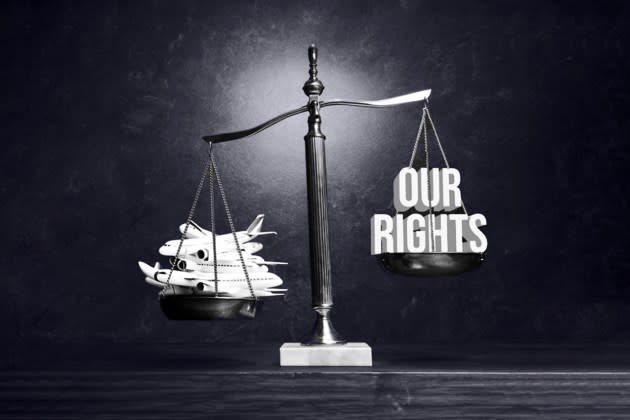Progressives Prep $10 Million Campaign to Expose ‘MAGA Supreme Court’
- Oops!Something went wrong.Please try again later.

United for Democracy, a coalition of progressive groups and labor unions, is gearing up to launch a $10 million persuasion and base activation campaign centered on “the MAGA Supreme Court.” The coalition will spend $1 million on ads in Arizona and Pennsylvania, as well as in the Washington, D.C., area, and the campaign will also involve canvassing and events, officials tell Rolling Stone.
The United for Democracy coalition, which launched last year with a seven-figure ad buy, counts 140 member organizations, including major labor unions, reproductive rights advocates, environmental groups, and liberal think tanks.
Stasha Rhodes, campaign director for United for Democracy, says the coalition’s latest campaign is about “talking to Americans across the country about the issues they care about, and how the Supreme Court is connected to either rolling back the progress or standing in the way of us being able to make progress on those issues.” The point, she says, “is taking this message outside of Washington, and directly to the American people.”
Republicans’ outsized role in crafting a radically right-wing Supreme Court — one that treats mass shootings as constitutionally unavoidable, ushered in abortion bans or restrictions in 21 states, and affords anonymous donors virtually unchecked power to buy political candidates and judges — might seem painfully obvious to some political observers, but surveys show it’s not.
In a memo sent to progressive leaders, Rhodes warns that voters largely do not blame former President Donald Trump or congressional Republicans — who together assembled the Supreme Court’s conservative 6-3 supermajority — for the decision that overturned Roe v. Wade and ended federal protections for abortion rights. She writes that many Democratic voters are “demoralized” about the Supreme Court and blame President Joe Biden for the abortion decision since it happened on his watch. (A recent New York Times poll offers better results for Democrats on this question, but still shows some Biden voters blaming him for the decision.)
She argues that progressives must work on “connecting the dots for voters,” as conservatives have for decades, and make taking control of — and reforming — the Supreme Court a core voting issue for their base.
Rhodes suggests messages tying together the “the bad actors”: “This Supreme Court is a Trump/MAGA Court; A vote for Trump/MAGA is a vote for the Roberts/MAGA Supreme Court. Then we need to layer in what they can do to check those bad actors: showing voters that they have an opportunity this November to register their objection against the MAGA politicians responsible for this Court at the ballot box.”
United for Democracy shared examples of its creative materials with Rolling Stone.

A video script says: “The MAGA Supreme Court is making a relentless power grab. While some fight to defend our rights, MAGA Republicans are working to help the court strip away our freedoms. They’ve stolen our reproductive freedom, our freedom from gun violence. They’ve let corporations pollute our drinking water. Again and again, this court has ruled for their billionaire donors — at the expense of our rights and freedoms.”
A planned Facebook ad says that Supreme Court justices are “rewriting the laws and rules to help their billionaire backers get richer and more powerful,” while another urges users to “tell Congress to fix the court.”
Since Trump and Republican lawmakers built their Supreme Court conservative supermajority, the justices have issued increasingly radical decisions. The Dobbs decision in 2022 allowed states to ban abortion; this term, the court could limit access to the abortion pill mifepristone, and justices could also allow states to bar hospitals from providing emergency abortion care necessary to protect a mother’s life or health.
In 2022, the Supreme Court issued a decision invalidating many gun control laws, finding that any such regulations must adhere to “historical tradition.” This term, the court will determine whether the government can prohibit violent domestic abusers from having guns.
Last year, the high court limited the scope of the Clean Water Act, in a decision that environmental advocates warn will threaten “clean drinking water sources for millions of Americans.” This term, the court is weighing a case designed to overturn a bedrock administrative law principle; doing so would empower legal challenges to federal regulations on climate and the environment, workplace safety, wages, and a whole lot more. It would be a major boon for corporate interests.
In the past year, ProPublica exposed conservative Justice Clarence Thomas for regularly accepting undisclosed luxury gifts from a billionaire Republican donor, and found Justice Samuel Alito had failed to report at least one free private jet flight provided by a billionaire donor as well. The Washington Post separately found that conservative judicial activist Leonard Leo had secretly steered consulting payments to Thomas’ wife.
The reports created an unprecedented crisis of legitimacy at the Supreme Court, and led to justices agreeing to an ethics code for the first time, though it is relatively weak.
The court’s rightward swing continues, and both Thomas and Alito have brushed aside ethical concerns. Meanwhile, the Supreme Court’s billionaire donors could benefit from another case at the high court this term — an effort to preemptively prohibit Congress from ever enacting a wealth tax.
Rolling Stone spoke with several member organizations in the United for Democracy coalition about the new campaign and why they believe it’s necessary.
“Over the last several years, we’ve seen the extreme majority in the Supreme Court roll back our basic freedoms,” says Kim Anderson, executive director at the National Education Association, pointing to the court’s decisions on “abortion rights, and interpreting the Second Amendment as if we are all living back in the 1780s.” She says Americans need “to understand that the people who interpret the laws are just as important as the people who write them — and right now, we have people who are interpreting the laws who have been bought and paid for by a select few.”
Patrick Gaspard, president of the Center for American Progress, says, “There’s a desire to help the general public understand how the courts are working to further undermine our rights, freedom, baseline democracy — from allowing Big Oil to further pollute the water we drink, to stripping us of protections at work, to interfering in our most personal health care decisions. The court already exercises enormous, outsized power in our lives. And some of these decisions would extend that authority in ways that I think distorts the public’s understanding and expectations of the courts.”
Pointing to the “relationship between sitting justices and multimillionaires and billionaires,” Gaspard says “there are massive questions of conflict of interest with this court.” He adds, “Being able to do the work of public education, building civic awareness around these cases, we hope will accrue to the benefit of the public in ways that will create some real scaffolding around questions of accountability.”
More from Rolling Stone
Wargame Simulation Predicts NATO Collapse if Trump Is Elected Again
J.D. Vance: Trump Isn't Antisemitic. CNN Host: He Had Dinner With Nick Fuentes
Team Trump Says Classified Docs Judge Aileen Cannon Is a 'Godsend'
Best of Rolling Stone


